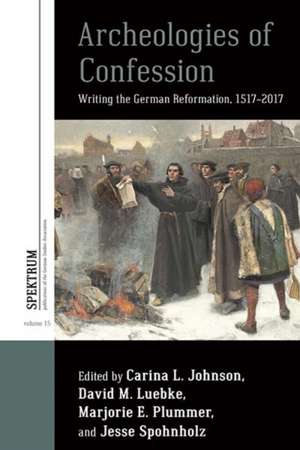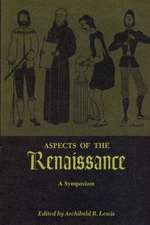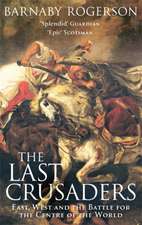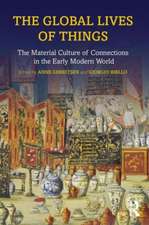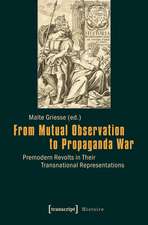Archeologies of Confession: Spektrum: Publications of the German Studies Association, cartea 16
Editat de Carina L. Johnson, David M. Luebke, Marjorie E. Plummeren Limba Engleză Hardback – 29 apr 2017
Modern religious identities are rooted in collective memories that are constantly made and remade across generations. How do these mutations of memory distort our picture of historical change and the ways that historical actors perceive it? Can one give voice to those whom history has forgotten? The essays collected here examine the formation of religious identities during the Reformation in Germany through case studies of remembering and forgetting--instances in which patterns and practices of religious plurality were excised from historical memory. By tracing their ramifications through the centuries, Archeologies of Confession carefully reconstructs the often surprising histories of plurality that have otherwise been lost or obscured.
Din seria Spektrum: Publications of the German Studies Association
- 14%
 Preț: 691.54 lei
Preț: 691.54 lei - 14%
 Preț: 691.85 lei
Preț: 691.85 lei -
 Preț: 224.20 lei
Preț: 224.20 lei - 14%
 Preț: 620.90 lei
Preț: 620.90 lei - 11%
 Preț: 729.02 lei
Preț: 729.02 lei -
 Preț: 266.18 lei
Preț: 266.18 lei - 23%
 Preț: 752.66 lei
Preț: 752.66 lei - 23%
 Preț: 751.44 lei
Preț: 751.44 lei - 23%
 Preț: 749.02 lei
Preț: 749.02 lei -
 Preț: 263.58 lei
Preț: 263.58 lei - 23%
 Preț: 805.06 lei
Preț: 805.06 lei - 23%
 Preț: 751.12 lei
Preț: 751.12 lei -
 Preț: 263.68 lei
Preț: 263.68 lei -
 Preț: 262.66 lei
Preț: 262.66 lei - 23%
 Preț: 752.13 lei
Preț: 752.13 lei - 23%
 Preț: 751.01 lei
Preț: 751.01 lei - 23%
 Preț: 806.68 lei
Preț: 806.68 lei - 23%
 Preț: 747.81 lei
Preț: 747.81 lei - 23%
 Preț: 748.14 lei
Preț: 748.14 lei - 23%
 Preț: 750.49 lei
Preț: 750.49 lei - 23%
 Preț: 749.77 lei
Preț: 749.77 lei - 23%
 Preț: 806.68 lei
Preț: 806.68 lei -
 Preț: 303.88 lei
Preț: 303.88 lei - 23%
 Preț: 750.66 lei
Preț: 750.66 lei -
 Preț: 261.18 lei
Preț: 261.18 lei -
 Preț: 263.29 lei
Preț: 263.29 lei -
 Preț: 262.91 lei
Preț: 262.91 lei -
 Preț: 259.64 lei
Preț: 259.64 lei - 23%
 Preț: 751.71 lei
Preț: 751.71 lei
Preț: 994.95 lei
Preț vechi: 1292.14 lei
-23% Nou
190.41€ • 206.75$ • 159.94£
Carte tipărită la comandă
Livrare economică 22 aprilie-06 mai
Specificații
ISBN-10: 1785335405
Pagini: 390
Dimensiuni: 152 x 229 mm
Greutate: 0.76 kg
Editura: BERGHAHN BOOKS INC
Seria Spektrum: Publications of the German Studies Association
Notă biografică
Jesse Spohnholz is Professor of History at Washington State University. His research focuses on confessional coexistence, religious exile, gender, and memory of the Reformation in the early modern Netherlands and northwest Germany. His books include The Tactics of Toleration: A Refugee Community in the Age of Religious Wars (2011) and The Convent of Wesel: The Event That Never Was and the Invention of Tradition (2017).
